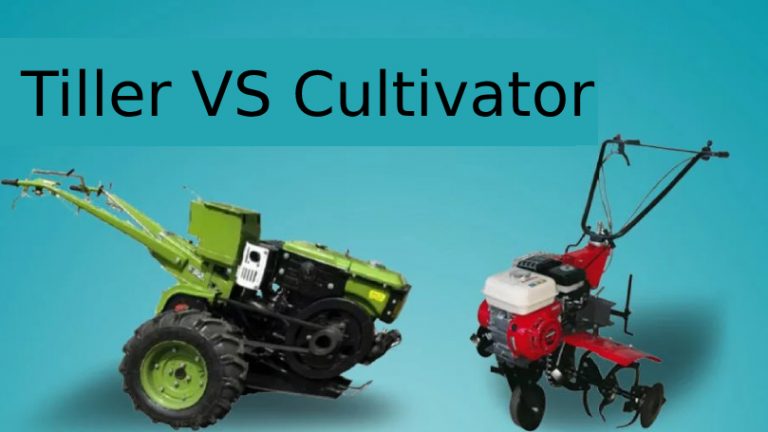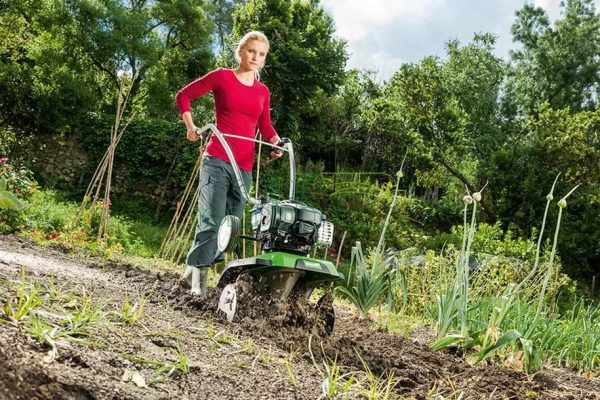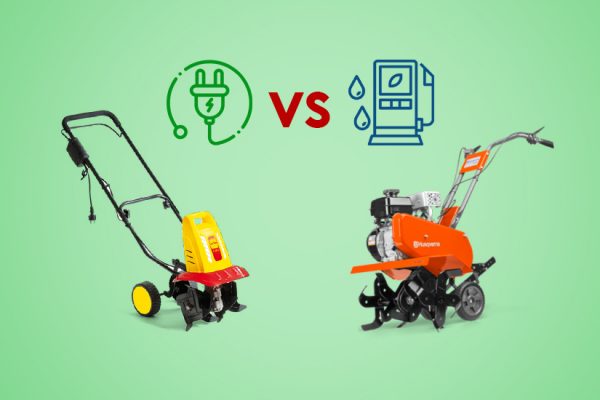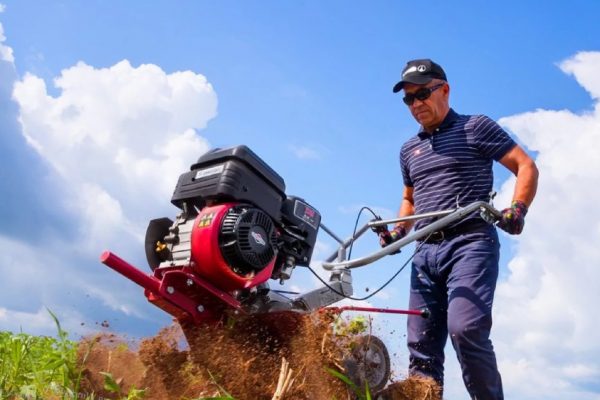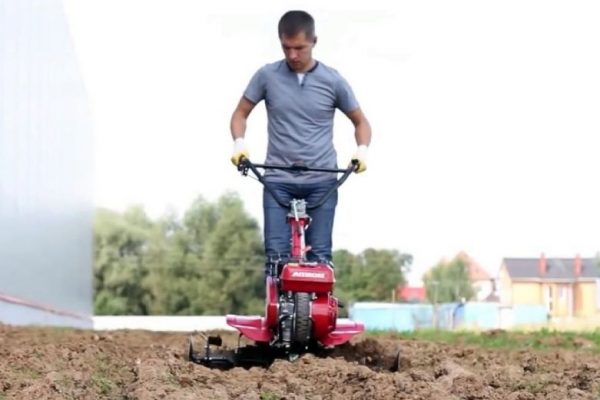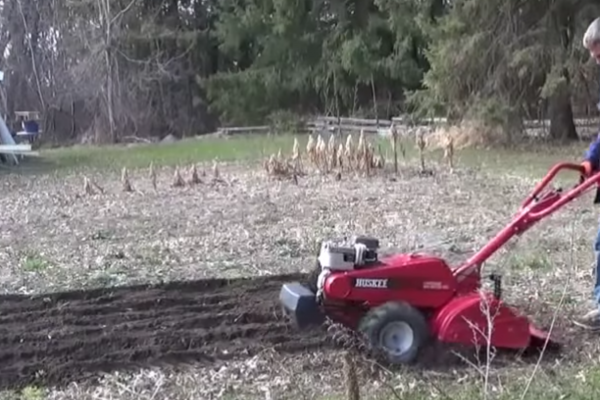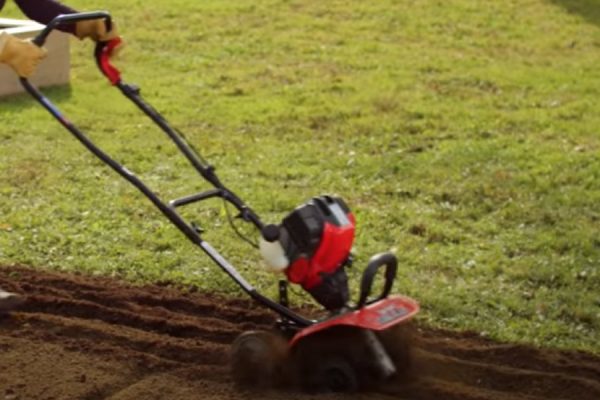Quite often you can note that the words cultivator and tiller are used interchangeably, but it’s important to understand that they refer to completely different devices which perform different tasks.
Jump To:
Quick Overview – 3 Best Garden Tillers
- Troy-Bilt Horse 306cc – Editor’s Choice, Best rear-tine tiller.
- Dirty Hand Tools – Also great rear-tine tiller, the new budget model.
- Husqvarna TF224 – Best front-tine tiller.
Quick Overview – 3 Best Cultivators
- Craftsman C210 – Editor’s Choice, the new budget model.
- Sun Joe TJ603E – Best Value. Powerful electric cultivator.
- Powerworks TL60L2510PW – Also great battery-powered electric cultivator.
Difference between tiller and cultivator
The difference between the cultivator and the tiller is that the tiller has much more options. They can be used not only for a variety of works in the garden (plowing, digging, loosening, aerating of roots, etc.) but also together with the corresponding attachments become assistants in the garden. Using them you can transport things, mow grass, pump water, clean snow, dig trenches and even stake firewood. This is due to the opportunity to use a wide range of attachments and powerful engine, which is a must.
Any tiller have appropriate technical parameters influencing their options. They are much heavier, equipped with a powerful engine with a gearbox, often have headlights. In general, the tiller differs in power, versatility and the ability to use this tool for all year round.
It is easy to understand what the difference is:
- the cultivator is smaller, lighter and more manoeuvrable;
- the tiller is more weighty, powerful and functional;
- the tiller has drive wheels, the cultivator has side cutters and a wheel for transportation;
- the difference of the tiller from the cultivator in price is 1.5-2 times.
To choose a tiller or a cultivator, you need to proceed from the area of your plot, its intended purpose (garden or flower beds with lawns) and the plants grown .
Garden Tillers
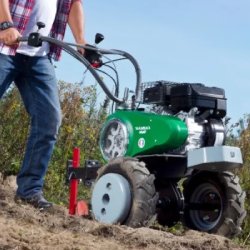
If you choose a tiller you are intended to concentrate on complicated tasks, cultivating hard and vergin soil in your garden.
Your tiller will be a creator.
There are three type of tillers: front-tine, rear-tine and mide-tine. The latter are less popular among the customers.
Remember, your choice of a tiller always depends on the objectives you have to achive, using it.
Comparison of the Best Garden Tillers
| Preview | Product | Type | Engine | Price |
|---|---|---|---|---|
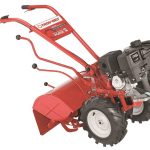 | Troy-Bilt Horse 306cc | Rear-Tine | Gas 306cc | $$$$$$+ |
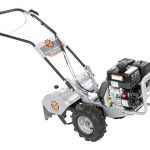 | Dirty Hand Tools | Rear-Tine | Gas 196cc | $$$$ |
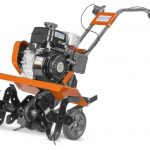 | Husqvarna TF224 | Front-Tine | Gas 208cc | $$$$$$ |
Front-tine tillers
These are perfect devices you will use for all the year round to fulfill plenty of tasks:
- break rocky and hard soil;
- loosen soil if it is firm;
- dig gardens.
It is easy and simple to reverse and turn this tiller compared to other types as the wheels are back-located.
Rear-tine tillers
If you need to start a large area for a new garden, rear-tine tiller is your best choice:
- break rocky and hard soil,
- loosen hard soil if it is firm,
- dig huge gardens or small farm arrears,
These tillers are more complicated to use due to the weight and dimensions. But at the same time this makes them more powerful compared to other types.
Pros of the tiller:
- high engine capacity;
- polyfunctionality and versatility;
- possibility to use for all year round;
- able to cultivate any type of soil.
- higher working capacity;
- treatment of all soil types;
- maneuverability, high permeability;
- versatility due to the use of attachments.
Disadvantages:
- Higher cost;
- Difficulty in operation, maintenance and repair;
- Large dimensions.
Cultivators
Comparison of the Best Cultivators
| Preview | Product | Type | Engine | Price |
|---|---|---|---|---|
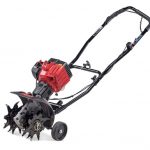 | Craftsman C210 | Front-Tine | Gas Powered 25cc 2-Cycle | $$ |
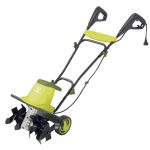 | Sun Joe TJ603E | Front-Tine | Electric 12-Amp | $ |
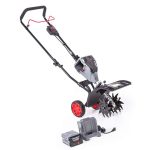 | Powerworks TL60L2510PW | Front-Tine | Battery-powered 2.5Ah 60V | $$$ |
If you decide on a cultivator be ready to get less powerful device which will not be suitable to cultivate hard and rocky soil but they are perfect for keeping your garden tidy and healthy during the gardening season. They will aerate the ground before planting, help to control weeds, an stir in fertilizers.
As a rule, cultivators are gas, electric and battery-powered unlike tillers which are only gas powered ones.
Cultivators are more limited in their abilities. Their main functions are cultivation, loosening, improvement of soil structure, its leveling. Usually they are very light (sometimes the weight of some models does not exceed 15 kilograms/33pounds). They do not have a gearbox, and the engine power varies from 3 to 6 horsepower. Often, instead of the wheels the standard configuration includes cutters. They have limited capacity to use attachments. There are gas, battery and electric-powered cultivators. Based on such options, it is better to use them only in the active period of the year (from spring to autumn).
Pros of the cultivator:
- It has a simple design, easy to operate and disassemble;
- transportability (even when assembled, it can be easy to ship in the car boot);
- opportunity to work in limited areas and hard to reach places (between trees, flower beds, near buildings). Any electric-powered cultivators additionally can work in a limited space (for example, in a greenhouse) due to the absence of exhaust;
- high maneuverability;
- low cost.
Disadvantages:
- limited functionality;
- low options;
- used seasonally.
What is better — the tiller or the cultivator?
As you can see, the cultivator and the tiller are completely different devices due to the functions. The tiller functionality is wider than that of the cultivator, but at the same time the latter is easier to operate and cheaper.
It is impossible to say unequivocally which machinery is the best. Cultivators are designed for soil cultivation and are used in gardens and around the country houses. Tillers can also plough the virgin ground and at the same time they can work for all season and have additional functions due to the attachments.
Choosing the tool you need to decide what it will be used for. If you need a multifunctional and powerful assistant, it is better to pay attention to the tiller. But if you are only going to cultivate the soil, the cultivator will be a good low-cost solution.
Cultivator vs Tiller
| Cultivator | Tiller | |
|---|---|---|
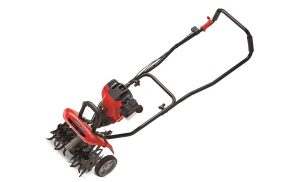 | 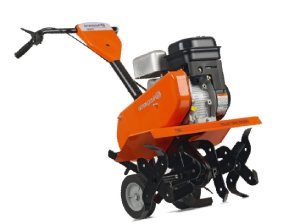 |
|
| Weight, Pounds | 40-100 | 100-250 |
| Power h.p | 3-6 (2-5kw) | 7-12 (5-10kw) |
| Frame design | Rigidity and frame weight depends on power | heavy and strenthenged frame |
| Сhange gear | limited by 1 gear, it is possible to set a direction for cutters | there is a change gear with at least 2 forward and 1 back gear |
| Power take | - | + |
| Air castors | Just few models have air castors | as a rule, there are air castors |
| Milling | Mail soil cultivation method | Can be used but is not the main cultivation method |
| Work with plow | Heavy-weight models can work with them but not or hard or rocky ground | Can work with double plow |

